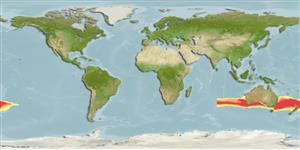Elasmobranchii (sharks and rays) >
Carcharhiniformes (Ground sharks) >
Pentanchidae (Deepwater catsharks)
Etymology: Asymbolus: Etymology not explained, possibly a-, Latin privative, i.e., without; sym-, from syn (Gr.), together or joined; bolus (L.), lump or morsel, proposed as a subgenus of Scyliorhinus (Scyliorhinidae) distinguished in part by labial fold of upper lip not hanging over lower-jaw symphysis of A. analis and A. vincenti (See ETYFish); submaculatus: sub (L.), under; maculatus (L.), spotted, referring to spots on undersurface in slightly more of half of the types (See ETYFish).
More on authors: Compagno, Stevens & Last.
Environment: milieu / climate zone / depth range / distribution range
Ecology
Marine; pelagic-oceanic; depth range 30 - 200 m (Ref. 36712). Temperate
Southwest Pacific: New South Wales, Australia. Eastern Indian Ocean: Western Australia.
Size / Weight / Age
Maturity: Lm ? range ? - ? cm
Max length : 41.4 cm TL male/unsexed; (Ref. 36712); 43.8 cm TL (female)
Short description
Identification keys | Morphology | Morphometrics
Body relatively robust; color pattern ornate and with multi-colored blotches overlaid with black spots. Caudal fin short; dorsal fins larger and more rounded. Tricuspidate teeth.
Life cycle and mating behavior
Maturity | Reproduction | Spawning | Eggs | Fecundity | Larvae
Oviparous, paired eggs are laid. Embryos feed solely on yolk (Ref. 50449).
Compagno, L.J.V., J.D. Stevens and P.R. Last, 1999. Australian spotted catsharks of the genus Asymbolus (Carcharhiniformes: Scyliorhinidae). Part 1: Descriptions of three new species from western Australia. p. 2-18. In P.R. Last (ed.). Australian catsharks of the genus Asymbolus (Carcharhiniformes: Scyliorhinidae). (Ref. 36712)
IUCN Red List Status (Ref. 130435: Version 2024-2)
Threat to humans
Harmless
Human uses
Tools
Special reports
Download XML
Internet sources
Estimates based on models
Preferred temperature (Ref.
123201): 15.3 - 19.9, mean 16.7 °C (based on 42 cells).
Phylogenetic diversity index (Ref.
82804): PD
50 = 0.5020 [Uniqueness, from 0.5 = low to 2.0 = high].
Bayesian length-weight: a=0.00355 (0.00175 - 0.00721), b=3.08 (2.90 - 3.26), in cm total length, based on LWR estimates for this (Sub)family-body shape (Ref.
93245).
Trophic level (Ref.
69278): 4.0 ±0.6 se; based on size and trophs of closest relatives
Resilience (Ref.
120179): Low, minimum population doubling time 4.5 - 14 years (Fec assumed to be <100).
Fishing Vulnerability (Ref.
59153): Low to moderate vulnerability (34 of 100).
